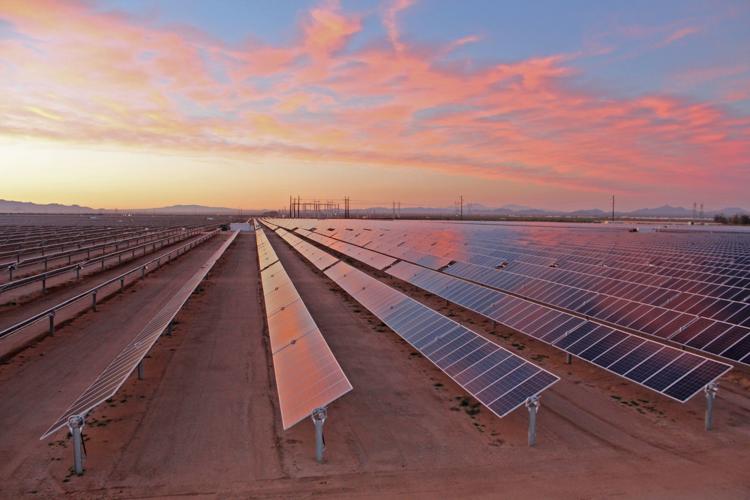The way Arizona Public Service has been intervening in the state’s politics recently, the conclusion comes naturally.
Of course APS, the state’s largest utility, opposes the clean-energy initiative because that proposal would hurt the company’s financial interests. Right?
That’s why the utility has been weighing in on Arizona Corporation Commission races and generally throwing its weight around in favor of the powers-that-be in Arizona’s politics — to protect its massive profits collected from captive ratepayers. Right?
“APS will do or say anything to protect their $488 million in profits,” said D.J. Quinlan, spokesman for the pro-initiative campaign, in a Monday press release denouncing the latest ads against the initiative.
Actually, though, the initiative could work the opposite way for Arizona utilities. If you accept the utilities’ conclusion that the initiative would force them into billions of dollars in new costs, APS and its parent company, Pinnacle West Corp., could make more money if Prop. 127 passes. So could Tucson Electric Power and other regulated utilities.
The initiative requires all the state’s public-service utilities — all the big electric utilities except Salt River Project, which is not regulated by the Arizona Corporation Commission — to get 50 percent of their energy from renewable sources such as solar and wind by 2030. It also requires that 10 percent of the energy come from rooftop solar arrays. This would be a constitutional amendment, so it would require a new constitutional amendment to change it.
APS, TEP and others have argued that it’s a bad idea because it will lead to increased electric rates for Arizona consumers. APS estimated around $1,000 per year per residential customer in 2030; TEP estimated $500 or so more that year.
Funny thing is, that could be good for those companies financially. See, the way Arizona utilities set their rates is by spelling out their operating and capital costs to the Arizona Corporation Commission. The commission considers their proposals in a “rate case,” tinkers with it, and then gives the go-ahead to the utilities.
In each case, their approved costs are covered, and if the companies perform adequately, providing electricity without big unexpected costs or inefficiencies, their profits are built in. In other words, if Prop. 127 passes and actually costs the utilities more, as they project, they will probably make more.
While the political sides have been slow to pick this up, the financial analysts who follow Pinnacle West’s stock are aware. After the Arizona Supreme Court approved the initiative for the ballot, Credit Suisse analysts said in a report:
“With the Arizona Renewable Energy Standards Initiative now on the November ballot, we note that, publicly, PNW has come out against the measure. However, we see this opposition driven by consumer protection rather than the possibility of underrecovered stranded costs. Should it pass, it could generate significant new investor opportunity for a combination of PPA (Power Purchase Agreements) and ratebase renewables over the next decade.”
That’s not completely intelligible for the layperson, but what it means is that the initiative could work out for Pinnacle West investors in the long run, because regulators will ensure their costs are covered, and that APS’s concerns are primarily for the consumer.
Tucson Electric Power, which announced last week it will break its tradition by contributing to a political action committee opposing the initiative, also recognizes it could benefit if the initiative passes.
“If we’re spending more money on the infrastructure necessary to satisfy that requirement, necessarily those rates would increase, and our revenues would rise,” spokesman Joe Salkowski told me.
He went on: “Just because our money comes from rates doesn’t mean we have a vested interest in high rates. We understand that the growth of the company depends on the economic success of the community we serve.”
This economic argument has some merit. It’s a drag on the economy if families and businesses have to pay more for power. But APS didn’t make it when I asked them for comment.
Spokesman Hal Pittman sent me an email with a written quote: “We oppose Prop. 127 because it is not good for our customers. If approved, this initiative would dramatically increase electricity costs to Arizona families, and low-income and fixed-income Arizonans would be hardest hit. Prop. 127 is the wrong plan for Arizona.”
Now, there’s a possibility that the increased costs projected by utilities are wrong or a red herring. The cost of solar and wind power has been plunging below that of fossil-fuel sources.
Kris Mayes, a former Arizona Corporation Commission member who supports the initiative, told me she thinks the real issue is that the utilities have proposed adding 5,900 megawatts in new natural gas plants, which would be more costly in the long run than the switch to solar.
“The utilities are opposed to Prop. 127 because they’ve made a gigantic bet on natural gas plants, and this would countermand that,” she said. “They would probably make more building expensive natural-gas plants.”
She noted that when APS proposed new natural-gas plants in its Integrated Resource Plan this year, the commission rejected the plan — the first time in memory that’s happened.
So there is an argument that the utilities are pursuing their own financial self-interest in fighting Prop. 127, but if their predictions are right that the proposition would cost them billions more, then their opposition is somewhat against that self-interest.






